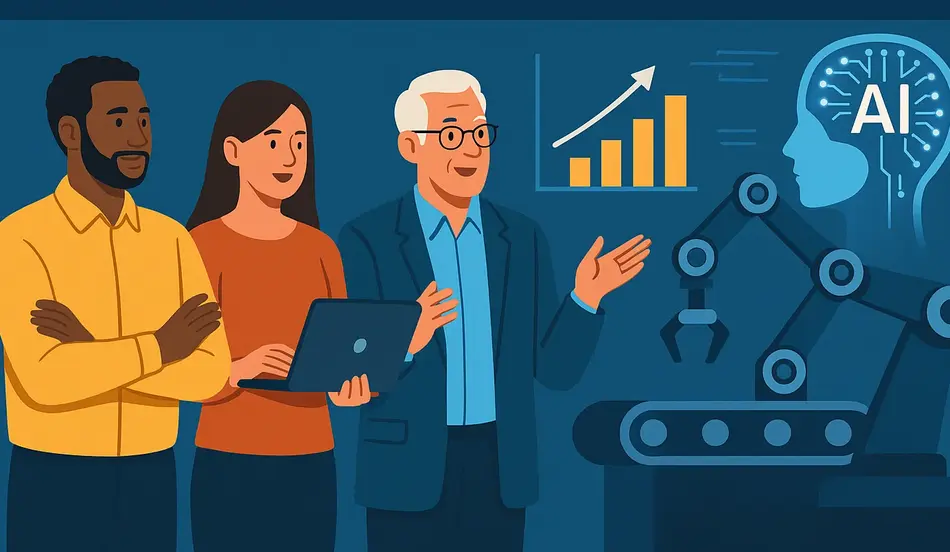Introduction: The Shifting Landscape of Employment
In today’s rapidly evolving job market, the workforce is undergoing a profound transformation. As depicted in Will Smith’s film “I Robot,” we’re witnessing a future where automation and artificial intelligence are revolutionizing traditional employment structures. While complete robot domination remains science fiction, the reality is that within the next five years, many current jobs will disappear while new opportunities emerge. This transformation is being driven by artificial intelligence advancements, climate change concerns, increasing automation, and shifting global economic priorities.
The period between 2025 and 2030 will mark a significant turning point in workforce composition. As the saying goes, “the one who is aware will win.” This comprehensive guide explores the future sectors poised for growth, identifies jobs at risk of automation, and provides actionable strategies to prepare for this new employment landscape.
Future Growth Sectors: Where Opportunity Awaits
The Service Sector: Evolution Beyond Basic Tasks
The service sector currently contributes over 55% to GDP and will play a crucial role in the nation’s ambition to become a $35 trillion economy by 2047. However, the nature of service jobs is changing dramatically:
- Low-skilled service jobs are disappearing as AI systems take over routine tasks
- Creativity paired with technical skills is becoming non-negotiable for career advancement
- Reskilling is essential in areas like AI, cloud computing, data science, and analytics
For those considering careers in this sector, merely obtaining certifications won’t suffice. The market demands professionals who dive deeper into specialized skills rather than remaining at surface level.
Digital Marketing: Beyond Basic Certifications
Digital marketing represents one of the most promising career paths as traditional media continues to decline while social media platforms expand their reach and influence. Key insights include:
- Team structure expansion: Each digital creator typically requires 10-20 support staff, including specialized marketers
- Skill-based meritocracy: Many successful digital marketers didn’t necessarily follow traditional educational paths
- Educational pathways: While MCA or MBA specializations in digital marketing provide solid foundations, practical skills ultimately determine success
The digital marketing landscape rewards those who continually evolve their capabilities beyond basic certifications, focusing on specialized niches and emerging technologies.
Logistics: The Backbone of E-Commerce Growth
The logistics industry is projected to reach a market size of approximately $380 billion by 2025, driven primarily by the explosive growth of e-commerce platforms like Amazon and Flipkart. This expansion creates numerous opportunities:
- Supply chain optimization becomes critical as companies seek to deliver goods efficiently across diverse geographies
- Government initiatives like Skill India are preparing youth for specialized logistics roles
- Educational requirements typically include MBA in Supply Chain Management or specialized diplomas in E-Commerce
As online shopping continues to grow, the logistics sector will require increasingly sophisticated talent to manage complex supply chains and delivery networks.
Finance: The Evergreen Career Path
Financial services remain consistently strong career options, with several emerging trends creating new opportunities:
- Democratization of investing through user-friendly apps has expanded the investor base beyond traditional demographics
- High-net-worth individuals increasingly seek specialized financial advisors to manage growing portfolios
- Niche areas like financial planning and portfolio management offer lucrative career paths
Financial advisors who can create and maintain investment portfolios worth hundreds of millions can earn substantial commissions while providing valuable services to clients seeking optimal returns.
Healthcare: Resilient Through Any Crisis
The healthcare sector demonstrates remarkable resilience even during economic downturns or global crises:
- Expansion beyond urban centers into tier 2, 3, and 4 cities, as well as rural areas
- Strong pharmaceutical industry creating diverse employment opportunities
- Increasing private sector participation driving job creation and innovation
- Telemedicine growth enabling remote consultations in previously underserved regions
Nursing represents a particularly promising career path, with significant shortages both domestically and internationally in regions like the Middle East, Europe, North America, Australia, and New Zealand.
Semiconductor Industry: The Future Powerhouse
The semiconductor industry represents perhaps the most promising sector for India’s economic future:
- Major manufacturing plants being established in prime locations
- Diverse job creation across skill levels from entry to advanced positions
- Educational requirements typically include B.Tech in electrical engineering or related fields
This industry could be instrumental in helping countries achieve its $35 trillion economy target while creating numerous high-quality employment opportunities.
Jobs at Risk: The Automation Challenge
While new opportunities emerge, certain sectors face significant disruption from automation and AI:
Manufacturing: The Robot Revolution
Manufacturing in India has traditionally been labor-intensive, providing employment to millions. However:
- Increasing automation is inevitable as manufacturers seek to optimize profits
- Job losses will occur as robots replace human workers in repetitive tasks
- MSME (Micro, Small, and Medium Enterprises) will also gradually adopt automation
Repetitive Knowledge Work: AI’s Growing Domain
Tasks involving repetitive cognitive processes are increasingly vulnerable to AI replacement:
- Content creation including script writing and image generation can now be performed by AI
- Call centers have been largely replaced by sophisticated chatbots
- Customer service roles are being automated through AI-powered systems
The Skills Gap Crisis: Workforce Challenge
According to the Skill Report, approximately 75% of current workforce suffers from a skills deficit, lacking the capabilities required for their positions. This represents a critical challenge for both individuals and the economy.
Many graduates operate under the misconception that completing formal education automatically guarantees employment. This fundamental misunderstanding leads to a significant gap between education and employability.
Need Career Advice?
Are you concerned about your future employability in this rapidly changing job market? WhatJobs Career Advice offers personalized guidance to help you navigate these challenges and develop the essential skills for the 21st century workforce. Our expert advisors can help you identify growth sectors aligned with your interests and create a personalized development plan to ensure your long-term career success.
Explore Career Resources at WhatJobs →Your Action Plan: Preparing for the Future Workforce
1. Obtain Foundational Credentials
While skills are increasingly important, formal education still serves as an entry point to many careers:
- Complete degree programs from the best institution you can access
- Recognize that tier 2-4 colleges will require additional self-directed learning
- Understand that a degree alone is insufficient in today’s competitive market
2. Develop Specialized Skills
The generalist approach is becoming less valuable as AI can perform multiple tasks at a basic level:
- Focus on developing deep expertise in specific areas rather than surface-level knowledge across many domains
- Prioritize creative and complex thinking that AI cannot easily replicate
- Continuously update skills to remain relevant as technology evolves
3. Stay Informed About Growth Sectors
Remaining aware of industry trends and emerging opportunities is critical:
- Research sectors with projected growth like semiconductors, healthcare, and specialized services
- Understand how automation might impact your chosen field
- Identify specialized niches within broader industries where human expertise remains valuable
4. Invest in Continuous Learning
The concept of education as a one-time event completed in your early twenties is obsolete:
- Adopt a lifelong learning mindset to continuously adapt to changing requirements
- Utilize online platforms for skill development and certification
- Seek mentorship from industry experts to understand practical applications of theoretical knowledge
5. Develop AI Collaboration Skills
Rather than competing against AI, the most successful professionals will learn to work alongside it:
- Understand AI capabilities and limitations in your field
- Learn to use AI tools to enhance your productivity and creativity
- Focus on developing uniquely human skills like emotional intelligence, ethical decision-making, and complex problem-solving
Hiring? Post Jobs for Free with WhatJobs
Are you an employer seeking talent with the essential skills for the 21st century workforce? WhatJobs connects forward-thinking companies with candidates who understand the importance of continuous learning and specialized expertise in today’s rapidly evolving job market.
Post Jobs Free on WhatJobs →FAQ: Essential Skills for the 21st Century Workforce
What are the most important skills needed to remain employable in the age of AI and automation?
The essential skills for the 21st century workforce include specialized technical expertise, creative problem-solving, emotional intelligence, and adaptability. While AI excels at repetitive tasks and basic content creation, humans maintain advantages in complex decision-making, ethical reasoning, and innovative thinking. Focus on developing deep expertise in specific domains rather than surface-level knowledge across many areas, as specialized skills are less likely to be automated in the near future.
How will AI impact different industry sectors over the next five years?
AI will transform industries differently based on their nature. Manufacturing and customer service will see significant automation of repetitive tasks, potentially reducing traditional employment opportunities. However, healthcare, specialized finance, and technology sectors will likely experience job growth as AI creates new roles focused on implementation, oversight, and innovation. The essential skills for the 21st century workforce will increasingly involve human-AI collaboration rather than competition against automated systems.
Is formal education still valuable in today’s rapidly changing job market?
Yes, formal education remains valuable as an entry point to many careers, but its nature is changing. Degrees from prestigious institutions still provide advantages, but graduates from all institutions must supplement their education with specialized skills development. The essential skills for the 21st century workforce often extend beyond traditional curricula, requiring self-directed learning and practical application. The most successful professionals combine formal credentials with continuous skills development throughout their careers.
How can I prepare for a career in emerging sectors like semiconductors or specialized healthcare?
Preparing for emerging sectors requires a strategic approach combining formal education with specialized skills development. Research the specific requirements of your target industry, obtain relevant technical qualifications, and develop practical experience through internships or projects. Stay informed about industry trends through professional associations and specialized publications. The most successful professionals in these fields possess both deep technical knowledge and the ability to adapt as technologies and methodologies evolve—truly embodying the essential skills for the 21st century workforce.






